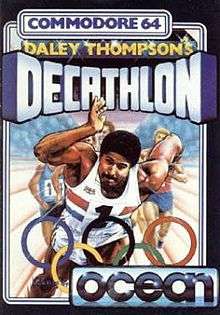Daley Thompson's Decathlon
Daley Thompson's Decathlon is a computer game developed and released under licence by Ocean Software in 1984.[2] It was released in the wake of Daley Thompson's popularity following his gold medals in the decathlon at the 1980 and 1984 Olympic Games. A second game, Daley Thompson's Super-Test was released the following year and the third title, Daley Thompson's Olympic Challenge was released in 1988 to coincide with the 1988 Olympic Games.
| Daley Thompson's Decathlon | |
|---|---|
 | |
| Developer(s) | Ocean Software |
| Publisher(s) | Ocean Software |
| Programmer(s) | Paul Owens, Christian Urquhart, Dan Hartley[1] |
| Artist(s) | David Thorpe |
| Composer(s) | Martin Galway |
| Platform(s) | Commodore 64, Amstrad CPC, Sinclair ZX Spectrum |
| Release | 1984 |
| Genre(s) | Sport |
| Mode(s) | Single-player, multiplayer |
Gameplay
The player takes part in the ten events of the modern decathlon:
- Day 1: 100 metres, long jump, shot put, high jump, and 400 metres
- Day 2: 110 hurdles, pole vault, discus, javelin, and 1500 metres
The player starts the game with three lives; failure to reach the minimum standard in an event results in the loss of one life. Success in the 1500 metres event results in the game returning to Day 1 to repeat the events with more difficult qualification criteria.
Depending on the computer, running is simulated by hitting two keys (representing the left and right leg) alternately and as quickly as possible or by moving the joystick from side to side as quickly as possible. The game rapidly gained a reputation among players as a "joystick killer" because of the constant vigorous waggling of the joystick required during many of the events.
The Spectrum version was the first game to use Speedlock, a fast loader on the computer.[3]
Music
The soundtrack of the C64 version of the game was composed by Martin Galway and David Dunn. The introduction music is based on the 1978 electronic music piece "Rydeen" by Yellow Magic Orchestra (YMO).
Reception
Sinclair User gave the game a score of 8/10.[4] The game won the award for Best (Overall) Arcade Game in the Crash magazine Readers Awards 1984[5] and was the Best Arcade-Style Game of the Year at the Golden Joystick Awards.[6]
In 2017, the game was placed on Eurogamer's "10 games that defined the ZX Spectrum" list.[7]
References
- "News". Crash. No. 9. Newsfield. October 1984. p. 41. Retrieved 3 April 2020.
- Bourne, Chris (November 1984). "Daley takes the gold". Sinclair User. EMAP. Archived from the original on 2001-02-23. Retrieved 6 January 2009.
- Eddy, Richard (1987). "The One David" (44). Crash. Retrieved 9 January 2013. Cite journal requires
|journal=(help) - "Daley takes the gold". Sinclair User. No. 32. EMAP. November 1984. p. 26. Retrieved 3 April 2020.
- "Crash Readers Awards 1984". Crash. No. 12. Ludlow, Shropshire: Newsfield Ltd. Christmas 1984. p. 96. Retrieved 2016-08-11.
- "News". Computer & Video Games. No. 44. EMAP. June 1985. p. 121.
- Mason, Graeme (9 April 2017). "10 games that defined the ZX Spectrum". Eurogamer. Gamer Network. Retrieved 10 April 2017.
External links
- Daley Thompson's Decathlon at MobyGames
- Daley Thompson's Decathlon at SpectrumComputing.co.uk